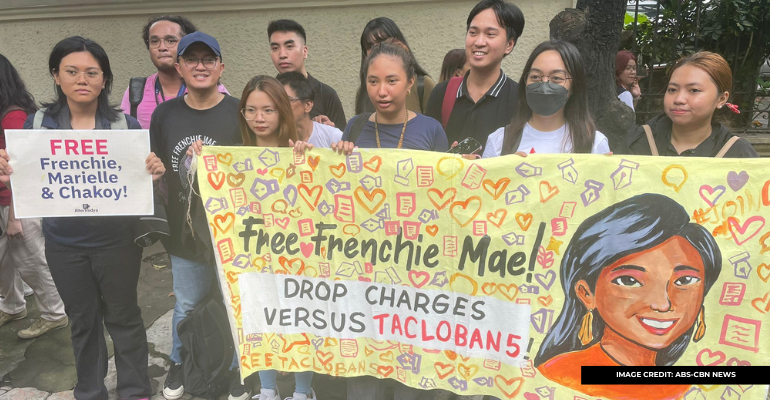Activists worldwide intensify calls for the release of Frenchie Mae Cumpio, a detained journalist in the country, and her co-accused, collectively known as the “Tacloban 5” or “Tac5.”
The group was arrested in February 2020 on charges of illegal possession of firearms and explosives. These claims are widely believed to be fabricated to suppress dissent and critical journalism.
United Nations Special Rapporteur Irene Khan recently visited the Tacloban City Jail, where Cumpio and others are held. Khan criticized the prolonged detention and the questionable legal processes.
“How long should they wait to be free?” she remarked, emphasizing that their trial, still ongoing after nearly four years, undermines international human rights standards.
Also Read: Duterte Admits He Had a Death Squad as Mayor of Davao City
Earlier this year, Khan dubbed the Philippines as one of the most dangerous countries to become a journalist. UNESCO statistics show that in the span of thirty years, one hundred seventeen journalists met their demise for their profession. Out of these, eighty-one are unresolved.
Frenchie Mae Cumpio, a known advocate for press freedom, has consistently asserted her innocence, presenting evidence in court of her legitimate work as a journalist. Her arrest followed police raids allegedly aimed at silencing government critics under the pretext of anti-insurgency operations.
Recently, she appeared in court to defend her case as a journalist in the Philippines. Cumpio emphasized that she legitimately worked in media and presented her official media ID. Moreover, she showed payment receipts to the radio station for airing “Lingganay,” which is their program.
Human rights organizations, including the National Union of Journalists of the Philippines (NUJP), have condemned the charges as politically motivated.
Filipino activists have rallied for Cumpio’s release, staging protests and launching online campaigns. They argue that the case highlights the broader suppression of media freedom in the Philippines, where journalists face increasing risks of harassment and imprisonment.
The international spotlight on Frenchie Mae Cumpio’s case, amplified by Khan’s intervention, underscores the urgent need for justice and the protection of press freedoms globally. To know more about the importance of press freedom and activism in the Philippines, read the details below:
Also Read: Quiboloy Allegedly Set Up The ‘Angels of Death”
Why is press freedom important in the Philippines?
Press freedom is crucial in the Philippines as it ensures that journalists can report on issues of public interest without fear of censorship or retaliation. The country has a rich history of investigative journalism that has exposed corruption and human rights abuses.
However, the Philippines remains one of the most dangerous places for journalists, with cases of harassment, legal threats, and violence. This environment highlights the importance of protecting press freedom to uphold democracy and accountability.
How does the judicial system handle cases involving human rights defenders in the Philippines?
The judicial process can be prolonged, especially for cases involving human rights defenders in the Philippines. While the legal framework theoretically provides for fair trials, in practice, activists and journalists often face delayed proceedings.
Moreover, these accusations are sometimes based on weak or politically motivated evidence. This underscores the need for judicial reforms to ensure timely and impartial justice.
What role do international organizations play in supporting Filipino activists?
International organizations such as the United Nations and Amnesty International play a critical role in advocating for the rights of Filipino activists. They provide platforms to raise awareness of cases like the Tacloban 5, apply diplomatic pressure on the Philippine government.
Additionally, they offer legal and moral support to those facing persecution. Their involvement helps amplify local efforts and keeps global attention on human rights issues in the Philippines.
Frenchie Mae Cumpio’s case is still ongoing at the Regional Trial Court (RTC) in her area. She and her companions continue to fight the allegations against them, with the support of global and national activists.
Keep Reading: Authorities Find Zamboanga Journalist Dead

Leave a Reply